 Richard Ross and Nathan Hill sat down to discuss the morality of the marine aquarium hobby. I imagine there were aquarists who wondered why any hobby needs “moral justification.” I often say that marine aquarium keeping has an original sin, we have removed an animal from their natural environment and placed them in captivity, for our own enjoyment. At a time when oceans around the world are experiencing untold pollution, loss and destruction, it would seem like trying to morally justify that action is impossible.
Richard Ross and Nathan Hill sat down to discuss the morality of the marine aquarium hobby. I imagine there were aquarists who wondered why any hobby needs “moral justification.” I often say that marine aquarium keeping has an original sin, we have removed an animal from their natural environment and placed them in captivity, for our own enjoyment. At a time when oceans around the world are experiencing untold pollution, loss and destruction, it would seem like trying to morally justify that action is impossible.
20 years ago, a conversation had not started among average hobbyists about whether or not the hobby was moral. Not many people kept reef aquariums, and the massive systems installed on shows like Tanked were a rarity. Today there are numerous vendors that specialize in the construction and installation of mega-aquariums, and wealthy fish collectors seek to have a specimen of every piscine jewel of the sea. The same can be said for coral, and a bevy of other marine species. Intelligent animals like octopus are relegated to the confines of an aquarist’s tank, likely one without a small fraction of the knowledge required to properly care for such an incredible animal.
There is a strong argument from within the hobby and outside, that many of these animals should be left on the reef. Cleaner wrasse for example serve important roles in wild reef ecosystems, yet often meet an untimely death in the aquarium. Yet, each year thousands are plucked from the reef and sold to aquarists, leaving many wild fish without a cleaning station to rid them of parasites, or aid in washing wounds. Folks like Snorkel Bob, and now Sea Shepherd International brought the moral discussion to our doorstep. Films like Blackfish, and the public perception that marine aquariums of any kind are inherently bad, has propelled the topic right into the halls of congress, with various conservation groups pushing for enhanced regulations on the marine aquarium industry, while others would like to see the hobby dismantled. NOAA has gotten involved, citing aquarium collection as a contributor to threatened status among 20 species of corals. It’s a fair assessment that some form of regulation will be enacted, related to the 20 coral species cited by NOAA.
A massive can of worms:
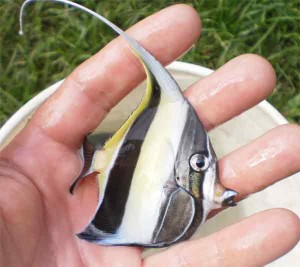 The argument that no animal should be removed from a natural habitat for humans to house and enjoy is an easy one to make. Animals, in a general sense, don’t really owe humanity hour upon hour of enjoyment. In fact, they don’t owe humanity anything. But over the years, human beings, as part of the natural world grew fond of various animal species. The domestication of dogs and cats has taken place for thousands of years. Companion horses became a beloved means of travel, serving today as catalysts for high profile sporting and recreation. Since man’s early history, human beings have turned to animals for companionship, aid and friendship. Sadly though, this history has led to a tremendous amount of suffering on the part of the animals.
The argument that no animal should be removed from a natural habitat for humans to house and enjoy is an easy one to make. Animals, in a general sense, don’t really owe humanity hour upon hour of enjoyment. In fact, they don’t owe humanity anything. But over the years, human beings, as part of the natural world grew fond of various animal species. The domestication of dogs and cats has taken place for thousands of years. Companion horses became a beloved means of travel, serving today as catalysts for high profile sporting and recreation. Since man’s early history, human beings have turned to animals for companionship, aid and friendship. Sadly though, this history has led to a tremendous amount of suffering on the part of the animals.
Dog shelters are so full of unwanted K9 companions, that they are forced to euthanize many of them. Farrell cats roam the streets and hills, and entire law enforcement task forces are dedicated to ending a non-stop cycle of animal cruelty. Dog fighting, cock fighting and other hideous acts of animal terror exist, even as our knowledge of animal intelligence and sentience has grown by leaps and bounds. In reality, if it can be said that the marine aquarium hobby is immoral, then animal husbandry in and of itself is highly immoral. Will future generations look at us with the same disgust most have for the slave traders of long ago?
A complex problem:
Both Richard Ross and Nathan Hill touched on many of the strings attached to the “moral aquarium” debate. Reef aquariums can help educate people about ecosystems they otherwise would never see. Perhaps a reef aquarium will foster a love of marine wildlife in children? The list goes on, almost forever. The argument was made, asking whether aquarists have inherently good intentions, or bad. Does the industry and hobby do everything in its power to limit or prevent needless suffering on behalf of the animals? If aquarists understood the journey marine life takes from its home, to the aquarium, would they still keep a reef aquarium? All of these are valid points, all have merit and are worthy of discussion.
The fact is, aquarists like keeping aquariums. If we didn’t, we wouldn’t do it. We enjoy the challenge of maintaining sensitive animals which are unlike anything else on Earth and appreciate the beauty of a well-managed reef tank. Aquariums and marine life are not an investment, they exist for the purpose of pleasure and unlike other areas of animal husbandry, aquariums are often filled with wild animals, not species raised solely in captivity.
An interesting note:
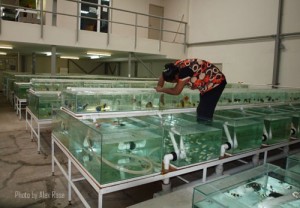 Often when debating the moral justification for the hobby, aquarists point out the growing list of captive bred and propagated marine animals. We likely can all agree that this is of benefit to everyone, aquarists and oceanic ecosystems. Yet captive animals still suffer, can be mistreated and may die prematurely due to conditions outside ideal parameters. According to both Ross and Hill, these are factors in the moral equation. A puppy mill isn’t a pleasant place, and a “fish-mill” that churns out species for the aquarium wouldn’t be much more pleasant. Many clownfish breeders cull their stock in an effort to obtain unique colorations. This means all the juveniles that aren’t up to snuff are killed. Is this moral? Are we doing the hobby, the ocean and especially the individual animals justice with such a practice? More important, is the aquarist who slaps down hundreds of dollars for a designer clownfish fueling the skewed morals of an inhumane industry? Using the argument that something was born in captivity to justify it being in captivity doesn’t carry water, as it cannot solve the dilemma of animal captivity in the first place.
Often when debating the moral justification for the hobby, aquarists point out the growing list of captive bred and propagated marine animals. We likely can all agree that this is of benefit to everyone, aquarists and oceanic ecosystems. Yet captive animals still suffer, can be mistreated and may die prematurely due to conditions outside ideal parameters. According to both Ross and Hill, these are factors in the moral equation. A puppy mill isn’t a pleasant place, and a “fish-mill” that churns out species for the aquarium wouldn’t be much more pleasant. Many clownfish breeders cull their stock in an effort to obtain unique colorations. This means all the juveniles that aren’t up to snuff are killed. Is this moral? Are we doing the hobby, the ocean and especially the individual animals justice with such a practice? More important, is the aquarist who slaps down hundreds of dollars for a designer clownfish fueling the skewed morals of an inhumane industry? Using the argument that something was born in captivity to justify it being in captivity doesn’t carry water, as it cannot solve the dilemma of animal captivity in the first place.
The end result:
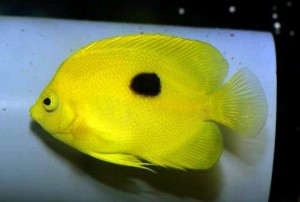 I think it can be said, and was alluded too by both Richard Ross and Nathan Hill, that removing animals from their wild home and placing them in captivity, at its very core and in any instance could easily be considered immoral. Perhaps ancient and modern day humans were so concerned with whether they could domesticate animals that they forgot to ask if they should. Sadly, animal captivity and domestication is commonplace, it exists and even if regulations come to pass in the aquarium world, this fact will not change. Where the moral crime is committed isn’t removing an animal from the wild to make it your companion and friend, or offer it a life in your home as your own equal (even though this can be considered immoral). The moral crime is turning this process into an industry, where balance sheets mean more than the lives, deaths, suffering and care of the animals you so beloved.
I think it can be said, and was alluded too by both Richard Ross and Nathan Hill, that removing animals from their wild home and placing them in captivity, at its very core and in any instance could easily be considered immoral. Perhaps ancient and modern day humans were so concerned with whether they could domesticate animals that they forgot to ask if they should. Sadly, animal captivity and domestication is commonplace, it exists and even if regulations come to pass in the aquarium world, this fact will not change. Where the moral crime is committed isn’t removing an animal from the wild to make it your companion and friend, or offer it a life in your home as your own equal (even though this can be considered immoral). The moral crime is turning this process into an industry, where balance sheets mean more than the lives, deaths, suffering and care of the animals you so beloved.
In this regard, both the hobby and the industry have failed miserably. It’s my belief that if every aquarist knew that for each living wild caught fish in their aquarium, hundreds of others died, they would continue to keep marine life. If an average aquarist had the option between a sustainably harvested fish that cost more, and a poorly collected/possibly ill one that was cheaper, they may very likely choose the cheaper option. I say this, because I have seen it happen time and time again, by aquarists who 100% knew better and were ignoring the guidance of educated aquarists. Taking an animal from the wild on one side of the world, and hustling it to the other as quickly and cheaply as possible doesn’t really have a profound moral justification. Aquariums kept by the super wealthy, that house rare species which belong in either the ocean or public aquaria (where at the very least they can be admired by the masses, cared for by experts in the field), isn’t something that conforms to any conservation or scientific ethic. It’s having something wild and alive because you enjoy it, simple as that. Worse, for some having rare, expensive and hard to find species has become a sort of status symbol. When owning something alive is a symbol of status, morals have left the building. Yet we see it all the time, just turn on the Kentucky Derby. Far worse is when killing something majestic, rare and incredible is also a symbol of status, along with having its head mounted to the wall. Again, morals are lost in translation. When many practices of animal husbandry and even hunting for sport began, humans had little scientific knowledge of animal intelligence and social behavior. Today we know that many species (fish included) are highly complex, and likely even self-aware. While this knowledge became the spear-tip of animal cruelty laws, those laws have not extended out to include piscine or coral animals. Nor did the Earth in that time have the desperate struggle our planet and oceans face today, where a worldwide fisheries collapse appears imminent within 50 short years.
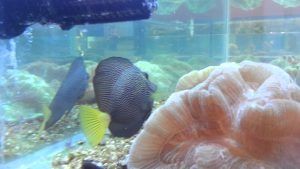 There is no reason to believe that information will make average aquarists behave any differently, nor is there any reason to believe that the intentions of those who seek to keep marine animals are inherently good. An industry has been built to provide people with a commodity, and that commodity happens to be marine life. It can certainly be argued that from the perspective of the industry marine life is just a number on a balance sheet (please note I am employing Rich Ross’ designation of industry and vendors. Vendors being those that make aquarium equipment). It can also be argued that for the majority of marine aquarists, an aquarium is more akin to their television than the ocean. Going out into an oceanic oil spill, collecting animals and rehabilitating them and releasing them back to the wild has ample moral justification. Taking something off its home on the reef, and placing it in your living room doesn’t. Often I hear aquarists praising themselves as conservationists, much like the Exxon commercials that promote the idea that fossil fuels contribute to a healthy environment.
There is no reason to believe that information will make average aquarists behave any differently, nor is there any reason to believe that the intentions of those who seek to keep marine animals are inherently good. An industry has been built to provide people with a commodity, and that commodity happens to be marine life. It can certainly be argued that from the perspective of the industry marine life is just a number on a balance sheet (please note I am employing Rich Ross’ designation of industry and vendors. Vendors being those that make aquarium equipment). It can also be argued that for the majority of marine aquarists, an aquarium is more akin to their television than the ocean. Going out into an oceanic oil spill, collecting animals and rehabilitating them and releasing them back to the wild has ample moral justification. Taking something off its home on the reef, and placing it in your living room doesn’t. Often I hear aquarists praising themselves as conservationists, much like the Exxon commercials that promote the idea that fossil fuels contribute to a healthy environment.
A serious situation:
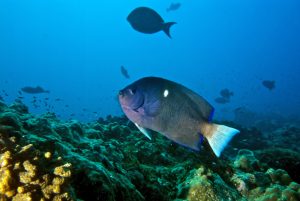 The moral argument surrounding marine aquariums may prove to be the biggest issue determining the hobby and industries’ future. While it’s abundantly clear marine aquariums leave less of an impact on ocean ecosystems than say commercial fishing, based on growing public perception they are nearly equally as hated. Diners don’t have to order orange roughy or snow crab for dinner, and people don’t have to have marine animals in their home. It seems like a moral argument for removing animals from their environment, domesticating them or eating them, even catching and killing them for sport, is potentially impossible. Something immoral has been done, in that human beings have needlessly interfered with the life of something else.
The moral argument surrounding marine aquariums may prove to be the biggest issue determining the hobby and industries’ future. While it’s abundantly clear marine aquariums leave less of an impact on ocean ecosystems than say commercial fishing, based on growing public perception they are nearly equally as hated. Diners don’t have to order orange roughy or snow crab for dinner, and people don’t have to have marine animals in their home. It seems like a moral argument for removing animals from their environment, domesticating them or eating them, even catching and killing them for sport, is potentially impossible. Something immoral has been done, in that human beings have needlessly interfered with the life of something else.
If we approach marine aquariums, from a perspective of industry and hobby, with the thought that we have done something immoral, but have a responsibility to make sure that every other aspect, from transport, sale, care and habitat are done under the best possible circumstances, then we have a shot at greatly improving the moral condition of the hobby. For this to happen on the side of industry, restraint on what species are collected, how they are collected and shipped and the effect on balance sheets would have to make some major, major improvements. On the hobby side, aquarists would need to make sure-fire dedication, while implementing a sustainable aquarium system, capable of keeping marine life healthy without the need for constant replacement. Sadly, unless forced too under law, I don’t see either scenario taking place in the foreseeable future, by which time the world’s oceans may no longer be able to provide resources for a marine fishery or marine aquarium hobby.
When looking at the state of the ocean, along with the current moral state of the aquarium hobby and industry, I am reminded of Robert Duvall’s line from the classic Apocalypse Now; “Someday this war is going to end.”










Couldn’t agree with you more. This industry is rife at all levels (collectors, wholesalers, retailers, hobbyists) with willful ignorance on the issue.